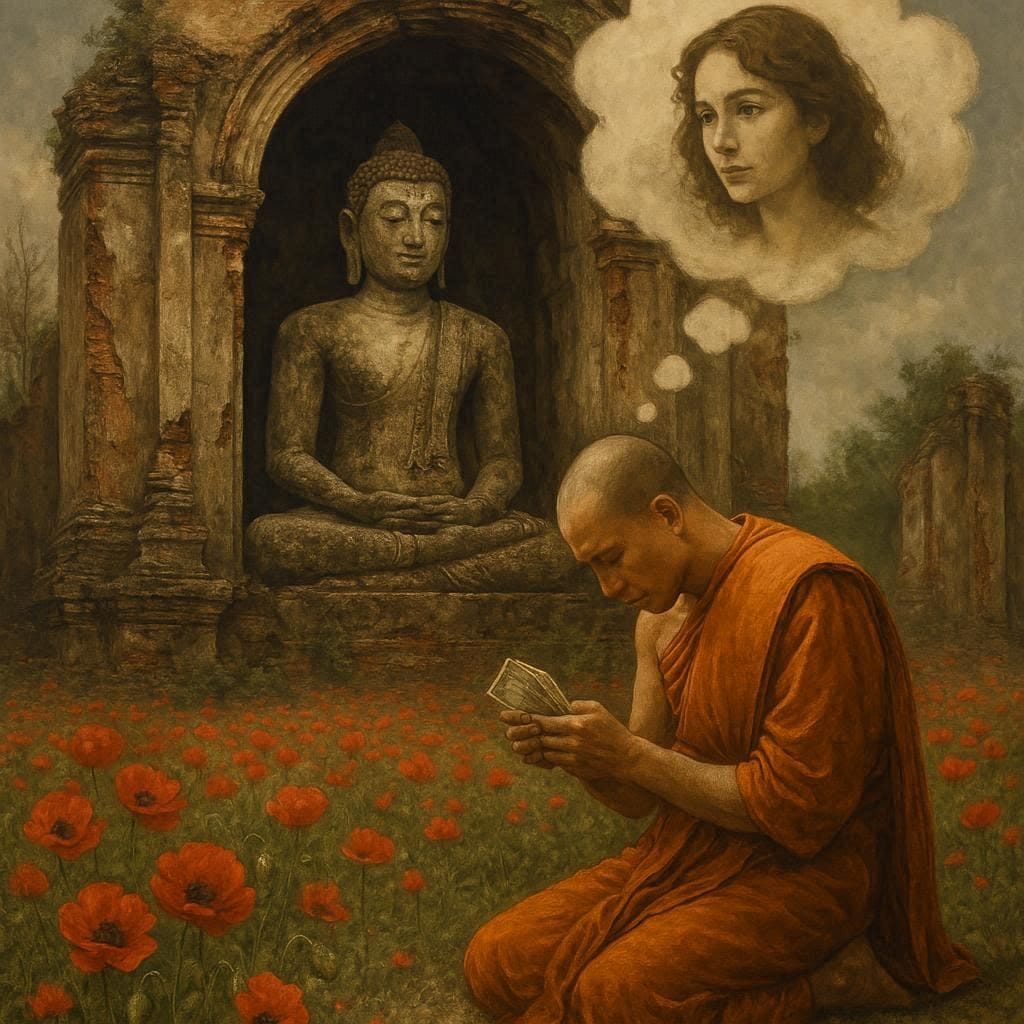Shi Yongxin, Buddhism, and the Tall Poppy Syndrome.

Health is the greatest gift, contentment the greatest wealth, faithfulness the best relationship. Gautama Buddha
This post continues the theme from our previous blog, The Seven Deadly Sins, Christianity, and the Tall Poppy Syndrome. I believe the 7DS are often found within TPS. Specifically, the sins of pride, lust, and greed are usually seen in public TPs, which justifies their toppling (see Anatomy of the TALL POPPY SYNDROME).
These three sins, which can be seen as specific forms of gluttony, often occur together, forming what I call the unhappy triad of TPS. These TPs may experience happiness at times during their journey, but they rarely reach a happy ending. These intense emotions and their resulting actions justify ending their status.
Buddhism is an ancient spiritual tradition founded in India by Siddhartha Gautama, known as the Buddha, over 2,500 years ago. Its core narrative focuses on understanding and overcoming suffering through ethical living, personal discipline, and meditation. By following the Buddha's teachings, practitioners aim to cultivate a sense of inner peace, wisdom, and compassion.
Fundamental tenets include the Four Noble Truths and the Noble Eightfold Paths. The Five Precepts guide day-to-day conduct for lay Buddhists: do not kill, do not steal, avoid sexual misconduct, do not lie, and avoid intoxicants. Core practices include non-harming, ethical speech, and mindful awareness in all aspects of life.
Zen Buddhism is a school within Buddhism, not a separate religion. Zen developed within the Mahayana Buddhist tradition around the 6th century CE in China, later spreading to Japan, Korea, and Vietnam. All Zen Buddhists are Buddhists, but not all Buddhists practice Zen.
Zen Buddhism is a meditation-centered branch that emphasizes direct experience over doctrine and theory. Its lifestyle is marked by simplicity, mindfulness, and immersing fully in every moment, often summed as "just sitting" (zazen). Zen teachings encourage practitioners to see into their true nature by cultivating a calm, alert, and deeply present mind, extending mindfulness into daily routines such as work, eating, and walking.
A Zen-like lifestyle in Buddhism involves maintaining calm through mindful meditation (zazen) and ethical living, characterized by honesty, compassion, and respect for all beings. It encourages non-attachment to possessions or fixed views. All actions, from mundane to significant, are considered opportunities for mindfulness and self-discovery. Their lifestyle emphasizes simplicity, present-moment awareness, and harmony in daily life.
Buddhist monks serve as spiritual leaders, teachers, and practitioners dedicated to preserving the Buddha’s teachings while supporting the lay community. In most Buddhist traditions, monks are expected to maintain celibacy and refrain from marriage. However, exceptions exist in some Japanese Buddhist sects where monks are permitted to marry and lead family lives.
Shaolin Temple, a UNESCO World Heritage Site, was founded over 1,500 years ago. It is the birthplace of Zen Buddhism and modern Chinese martial arts (kung fu).
The temple’s legendary warrior monks have inspired countless generations in China and across the world, making Shaolin a symbol of harmony between body and mind. Its cultural legacy thrives in modern times through teaching, performance, and global martial arts schools, preserving a tradition that is both spiritual and athletic.
The story of the Shaolin Temple embodies resilience, innovation, and the harmonious union of rigorous mental and physical practice, remaining an enduring icon in Chinese and Buddhist history.
Shi Yongxin is a Chinese Buddhist monk who served as abbot of Shaolin Temple from 1999 until 2025.
Shi became known for his role in commercializing the temple and earned the nickname "CEO Monk" for managing it like a business. As of 2023, he controlled 18 companies, with the temple having registered over 700 trademarks and operating cultural centers in over 50 countries.
When he entered Shaolin in 1981, the monastery was poor and had fewer than 30 people. He became the assistant to the abbot in 1987 and the abbot in 1999 after the abbot's death.
Yougkin globetrotted by air and luxury cars, meeting world dignitaries. He accepted luxurious offerings. He defended his lavish lifestyle and financial performance by securing Shaolin's future and stature. He became vice president of the Buddhist Association of China in 2002.
In late July 2025, the Shaolin Temple announced that Shi Yongxin is under investigation for alleged criminal misconduct, including embezzlement and misappropriation of temple funds and assets, which include owning luxury properties. He is also accused of seriously violating Buddhist precepts by maintaining improper relationships with multiple women over an extended period and fathering at least one child.
This isn't the first time he's faced such allegations - similar accusations arose in 2015 when a self-identified insider posted claims portraying him as an embezzler and womanizer with illegitimate children, although authorities later dismissed those claims.
The Fox Guarding the Henhouse. In 2018, the president of the Buddhist Association, which oversees Buddhist practices, was accused of sexually harassing nuns and embezzling funds, and then resigned.
China's Buddhist Association stated that Shi Yongxin's actions are extremely harmful and seriously damaged the reputation of the Buddhist community. They strongly support handling Shi in accordance with the law. So far, they have agreed to the recommendation to defrock Shi and have invited the head of another temple to come to Shaolin as the new abbot.
The investigation is still ongoing, and Yougkin cannot leave the country.
Last week's blog focused on an American in a similar situation. Both men engaged in blatant acts of lust, pride, greed, and hypocrisy—men with similar feelings across different cultures, ending in similar consequences (tall poppied).
Practicing the principles of Buddhism and the virtues of Christianity should have helped them overcome their hypocrisy, pride, greed, and lust. Living with integrity, humility, generosity, and chastity would have prevented their downfall. Instead, they prioritized themselves over others.
Tall Poppy Syndrome Newsletter
Join the newsletter to receive the latest updates in your inbox.



